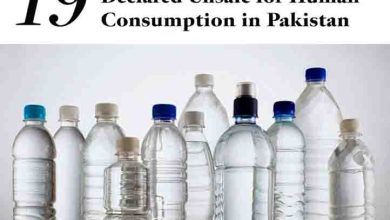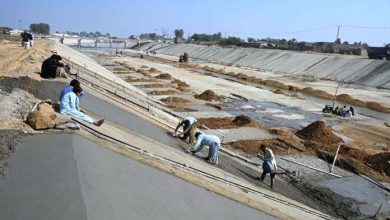IWMI has great potential to lead us in achieving water secure Pakistan: Ahsan Iqbal
APP, 24 Oct 2022
ISLAMABAD : International conference on “the Role of Water-Energy-Food-Ecosystem (WEFE) Nexus for a Climate Resilient Pakistan” commenced here Monday aimed at identifying gaps in the water related policy, procedures and practices and strengthening capacities for competing water requirements of multiple sectors.
The three-day conference would also focus improving water governance, and strengthen water, food security and nature-based solutions.
The conference is being organized by the International Water Management Institute (IWMI) in collaboration of ministries of planing and development, water resources etc in connection with Pakistan Water Week 2022.
Minister for Planning Development and Special Initiatives, Professor Ahsan Iqbal inaugurated the International Conference on Pakistan Water Week 2022.
The conference began with experts focusing on a range of conservation measures, such as Integrated Water Resources Management (IWRM), improving water governance, Nature-based Solutions, strengthening water and food security, technological innovation, and greater awareness raising, for sustainable development in Pakistan.
“I strongly believe that owing to the recent extreme climatic events in Pakistan, the second Pakistan Water Week moot will help the organizers, line departments, and stakeholders in the formulation and shaping up of policies aiming at a climate resilient Pakistan”, said the minister, while inaugurating the conference as a chief guest.
The first session was attended by Dr. Rachael Mcdonnell, Deputy Director General, IWMI, IWMI Board Member, Simi Kamal, Dr. Mohsin Hafeez, Country Representative, IWMI Pakistan and water and climate experts. The conference will continue till October 26 which includes an exhibition as well.
“IWMI has great potential to lead us in achieving water secure Pakistan through sharing best scientific practices for the successful implementation of national policies on water, climate, and food security”, said the minister.
The minister further added that there are clear opportunities to reduce the adverse impacts of climate change on poor rural communities and IWMI could play a significant role in this transformational journey. “In the wake of the imminent water crisis and prevailing climate change impacts, this International conference will lead to devise a workable, inclusive and comprehensive guidance for developing sustainable land and water slutions in the Indus Basin,” remarked the minister.’
The minister further added that for the country’s water and food security, the construction of two mega storage dams i.e. Diamer Basha Dam and Mohmand Dam Hydropower project has been initiated. These together with other small dams would add 10 MAF storage by 2030.
Similarly, he added that recently, Naulong Multipurpose Dam and Chashma Right Bank Canals have been approved by ECNEC which together would bring 333,000 acres of barren land under cultivation thus bringing socio-economic uplift in the project areas.
For the country’s energy security, the government is striving hard to harness the identified environment-friendly hydropower potential of over 42,000 MW generation capacities available in the Upper Indus Basin, known as Indus Cascade, in a drop of more than 7,000 feet within a stretch of 500 km length, said the minister, while highlighting the initiatives taking by the government.
He said it was not possible for a planet to be a water scarce with 70% area under water. However he said the challenge was only how to make the sea water usable by utilizing the modern technology of desalination.
Dr. Rachael Mcdonnell, Deputy Director General, IWMI, said that IWMI is transforming lives all over the world. In Pakistan, our projects are having a significant impact, as we focus on water governance in Punjab, reduce constraints to the productive and sustainable use of water for agricultural production and Integrated Water Resource Management in Balochistan.
Due to the recent floods in Pakistan, we are supporting the National Disaster Management Authority NDMA, Punjab Disaster
Management Authority (PDMA) with the development of a flood inundation map to provide a quick assessment of the extent of floods in Rajanpur district and crop assessment.
Dr. Mohsin Hafeez, Country Representative – Pakistan and Regional Representative – Central Asia, IWMI called for improving water security in the wake of recent floods in Pakistan.
According to him, “Pakistan received almost 400 per cent more rainfall this year, which caught us unprepared. Over 1600 lives have been lost and the economy has suffered damages worth billions of dollars. It is imperative that we adopt a Water-Energy-Food-Ecosystem (WEFE) Nexus approach to see things holistically.” he added.







